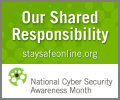Careers in Cyber Security: What Women Need To Know
If you're a woman interested in earning a cybersecurity master's degree, career opportunities are limitless. Here are some tips for success.

If you're a woman interested in earning a cybersecurity master's degree, career opportunities are limitless. Here are some tips for success.


Do you know what the deputy undersecretary for cyber security at the Department of Homeland Security and the information security risk manager at Facebook have in common?
Both are among the few women in top U.S. cyber security positions.
Cyber security is a critical issue facing the United States today and demand for qualified cyber security professionals is greater than ever. That's why Saint Leo recently launched a new Master's in Cyber Security degree program, which will be available totally online in March 2015: to meet this urgent need.
Despite the cyber security field's unprecedented growth, the simple fact is women represent just 11 percent of the information security profession.
While cyber security postings are growing twice as fast as IT jobs overall, the profession as a whole has been slow in tapping into the pool of talent represented by women.
Saint Leo University's assistant professor of computer science Audrey Gendreau acknowledges the under-representation of women in the cyber security field. Today, the cyber security class she teaches has only one female student.

"There's only one woman in my entire class of 30 students," she says. "I think what's driving interest in computing is video games and hacking – breaking into things – and that appeals to men. Women tend to be more interested in creating and building."
Gendreau was working as a seismologist in the petroleum industry when she began dabbling in computing.
"I started learning how to create static maps. It was so much fun; I fell in love with it," she says. "I wanted to learn more about computers, so I pursued classes while I continued to work."
That passion led Gendreau to a master's degree in computer science and a 12-year career as a programmer in the private sector. In 2014, she added a Ph.D. to her resume, as well as an NSA graduate certificate in information system security. Her mentor, Saint Leo professor Michael Moorman, encouraged her to pursue the field of cyber security.
"It's a very opportunistic time because not very many women are in it," she says. "I've been told by security experts in the Department of Defense that they need a woman's perspective for a well-rounded team."
Raising awareness about the importance and nature of cyber security is the goal of Women in Cyber Security (WiCyS), an online community for women in the field. Through networking and activities, the group works to generate interest among students and professionals to consider cyber security as a viable and promising career option.
"Women are half of the U.S. workforce and represent an excellent resource for filling and diversifying our current and future needs for the cyber security workforce," the organization says.
WiCyS attributes several factors to the significant under-representation of minorities, especially women, in cyber security:
Felice Flake is a student in Saint Leo's new Master of Cyber Security degree program and understands the challenges faced by women in the IT field.

Flake worked in corporate training and management where her technology-specific role was focused more on proprietary software programs. For several years she was a Microsoft educator in the private sector before signing on with a government agency, where she worked with distributed learning technologies. Eventually she was tapped to manage the program.
"That took things to another level," she says, adding that she needed to prove herself in the male-dominated arena.
"I needed to show my commitment level was there, even sitting on the floor and taking apart a CPU. I needed to stand my ground when I was right, or admit when I didn't know something."
Flake, who also holds an undergraduate degree in criminal justice with a specialization in homeland security from Saint Leo University, believes it's important for men and women to acknowledge and respect one another's expertise and professionalism, and realize that both bring value to the table.
"Men cut across emotions; they have a completely different way to communicate and handle conflict," she says. "Women add a different perspective; they clue into the emotional piece."
That emotional awareness could be an important factor when anticipating the next move of an email hacker.
Flake, who hopes to be an assistant vice president or vice president in an IT security or government security role, believes working together should happen early on. "Let's not say 'girls in technology,' let's say 'kids in IT;' let's get them working together when they are young, when they are 12 or 13."
And she believes providing outreach and encouragement to young women and girls to embrace their interest in STEM careers is critical.
For women considering a future in cyber security, Gendreau and Flake offer sage advice:
Now is the time, according to Flake.
"The Wild Wild West of the Internet is what we're facing," she says. "Opportunity is everywhere."

National Cyber Security Awareness Month
This post is one in a series in recognition of National Cyber Security Awareness Month. Since 2004, the Department of Homeland Defense and the National Cyber Security Alliance have designated October as National Cyber Security Awareness Month. For more information, visit StaySafeOnline.org.
Other posts you may be interested in reading:
For The Best Cyber Security Jobs, Don't Overlook Certification
What Sets Saint Leo's Cyber Security Program Apart?
5 Reasons SLU's Cyber Security Program Is Right For You
Ethical Hacking: Do You Have What It Takes?
Image Credit: Ollyy on Shutterstock